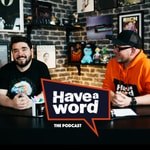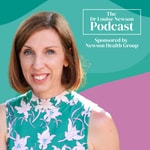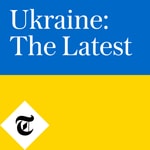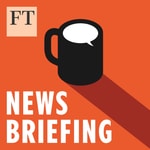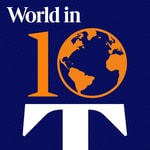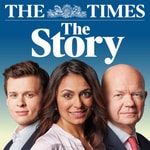The world, the universe and us – Details, episodes & analysis
Podcast details
Technical and general information from the podcast's RSS feed.
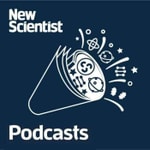
The world, the universe and us
New Scientist
Frequency: 1 episode/5d. Total Eps: 380

Podcasts for the insatiably curious by the world’s most popular weekly science magazine. Everything from the latest science and technology news to the big-picture questions about life, the universe and what it means to be human.
For more visit newscientist.com/podcasts
Hosted on Acast. See acast.com/privacy for more information.
Recent rankings
Latest chart positions across Apple Podcasts and Spotify rankings.
Apple Podcasts
🇬🇧 Great Britain - science
31/07/2025#14🇬🇧 Great Britain - science
30/07/2025#12🇬🇧 Great Britain - science
29/07/2025#12🇬🇧 Great Britain - science
28/07/2025#11🇬🇧 Great Britain - science
27/07/2025#11🇬🇧 Great Britain - science
26/07/2025#14🇬🇧 Great Britain - science
25/07/2025#13🇬🇧 Great Britain - science
24/07/2025#13🇬🇧 Great Britain - science
23/07/2025#15🇬🇧 Great Britain - science
22/07/2025#13
Spotify
🇬🇧 Great Britain - science
31/07/2025#20→🇬🇧 Great Britain - science
30/07/2025#20→🇬🇧 Great Britain - science
29/07/2025#20↘🇬🇧 Great Britain - science
28/07/2025#19↘🇬🇧 Great Britain - science
27/07/2025#17→🇬🇧 Great Britain - science
26/07/2025#17→🇬🇧 Great Britain - science
25/07/2025#17→🇬🇧 Great Britain - science
24/07/2025#17↘🇬🇧 Great Britain - science
23/07/2025#16→🇬🇧 Great Britain - science
22/07/2025#16→
Shared links between episodes and podcasts
Links found in episode descriptions and other podcasts that share them.
See all- https://988lifeline.org/
1207 shares
- https://www.samaritans.org/
1131 shares
- https://twitter.com/rowhoop
46 shares
- https://twitter.com/chelswhyte
22 shares
- https://twitter.com/DownHereOnEarth
22 shares
RSS feed quality and score
Technical evaluation of the podcast's RSS feed quality and structure.
See allScore global : 48%
Publication history
Monthly episode publishing history over the past years.
Weekly: First living transparent mouse; lab-grown stem cells; Spy balloons
Season 1 · Episode 266
vendredi 6 septembre 2024 • Duration 22:47
🎧 Episode 266
⚡️ The first human blood stem cells have been created in a lab and successfully turned into functioning bone marrow. This research could revolutionise the treatment of blood cancers like leukaemia and lymphoma. So far it’s only been tested on mice, but researchers are hopeful it could work in humans too.
⚡️ In other mouse news, we are now able to turn mice see-through. Using a surprisingly common food dye, researchers have turned the skin of living mice transparent. The technique, which didn’t harm the mice, offers a new (though gruesome) look into the living body.
⚡️ The US is planning to launch spy balloons to carry out surveillance and act as backup communication links. The news comes just a year after the US shot down a Chinese balloon that was full of intelligence-gathering equipment. Coincidence? Find out why balloons are making a comeback.
⚡ Bats have a huge role in human health, often harbouring diseases that are then passed onto us, such as rabies and covid-19. But it turns out when bat populations collapse, that’s also bad for human health. New research finds that when bats die, insecticide use in agriculture goes up and so does infant mortality – find out how the three are linked.
⚡ How dark is deep space? Are there any regions of the universe that are completely and utterly devoid of all light? Researchers now have an answer. Plus, ISS astronauts report a strange noise on Boeing’s stranded Starliner capsule.
🎙️ Hosts Timothy Revell and Christie Taylor discuss with guests James Woodford, Chris Simms, Jeremy Hsu and Michael Le Page.
📕 To read more about these stories, visit newscientist.com.
Hosted on Acast. See acast.com/privacy for more information.
Weekly: Could mpox be the next covid-19?; Science of beat drops; Clothes made from potatoes
Season 1 · Episode 265
vendredi 30 août 2024 • Duration 27:15
🎧 Episode 265
⚡️ The latest mpox variant has infected a record number of people in central Africa, has been found in travellers in Sweden and Thailand, and the World Health Organization has now declared it a public health emergency of international concern – just 15 months after the previous such declaration for mpox expired in 2023. But is this virus likely to become another covid? And as health authorities in the most affected countries struggle to keep it under control, will we be able to avoid further global outbreaks of the disease?
⚡️ New rogue worlds have been discovered in our galaxy that resemble both planets and stars but are neither. Thought to be brown dwarfs, the sheer number of them calls into question our understanding of how planet-sized objects form. This, plus another failed – but also successful – attempt to find dark matter’s hypothesised WIMPs.
⚡️ As a piece of music builds up to its crescendo, our brains know exactly when the beat is about to drop. Researchers have discovered the parts of our brains that are responsible for making sense of musical changes or “boundaries” – and this is true whether you’re listening to Mozart or Metallica.
⚡ Clothes made from…potatoes? An idea to turn fibres from potato stems into fabric has turned from concept to reality. If we can use potato fibres instead of other more energy intensive materials, the designers say, we could reduce the environmental footprint of clothing production.
🎙️ Hosts Timothy Revell and Christie Taylor discuss with guests Alexandra Thompson, Leah Crane, Grace Wade and Madeleine Cuff.
📕 To read more about these stories, visit newscientist.com.
Hosted on Acast. See acast.com/privacy for more information.
Weekly: Shocking source of deep sea oxygen; Alcohol really is unhealthy; ‘Green’ plastic downsides
Season 1 · Episode 260
vendredi 26 juillet 2024 • Duration 31:54
#260
Most of us imagine plants when we think about the production of oxygen. But turns out, in the deep sea, metal-rich rocks also seem to generate oxygen. This surprising discovery suggests they may have a much more important role in their ecosystem than we originally thought – and is fueling more calls to ban deep sea mining, which would target these same rocks.
Drinking a glass of wine once in a while can’t be that bad, right? Over the decades we heard that drinking a little alcohol might reduce your risk of heart disease, and even make you live longer, but a new review of the research has found serious flaws in these studies. So what’s going on with alcohol and our health?
Physicists have been crashing atoms together for decades, in the hopes of creating heavier and heavier elements. And now, a new method to make the rare, super-heavy element livermorium may also pave the way towards making the elusive element 120, unbinilium. If successfully created, it would be the heaviest element on the periodic table. So what is this new method?
Some disheartening news: our attempts to be more environmentally friendly might still make some things worse. Biodegradable plastics appear to damage soil and hinder plant growth more than conventional ones. What’s going wrong?
Plus: How AI mathematicians are finally catching up to humans; how AI could spy on you through HDMI cables; and what caused the biggest cosmic explosion ever seen.
Hosts Christie Taylor and Timothy Revell discuss with guests Madeleine Cuff, Michael Le Page, Karmela Padavic-Callaghan and Alexandra Thompson.
To read more about these stories, visit newscientist.com.
Hosted on Acast. See acast.com/privacy for more information.
Dead Planets Society: #6 Make Venus Earth Again
Season 1 · Episode 6
lundi 25 septembre 2023 • Duration 20:41
Are the stresses of life getting too much? Fancy a relaxing getaway to a planet with stifling sulfuric acid clouds, choking quantities of CO2 and punishing amounts of atmospheric pressure? Yeah, neither do Chelsea and Leah.
That’s why, with the help of planetary scientist Paul Byrne at Washington University in St. Louis, they’re reinventing Venus, our uninhabitable neighbour. Together, they attempt to clear the air, smash it senseless with asteroids and move it farther from the sun… all for a few quintillion dollars.
Dead Planets Society is a podcast that takes outlandish ideas about how to tinker with the cosmos – from punching a hole in a planet to unifying the asteroid belt to destroying the sun – and subjects them to the laws of physics to see how they fare.
Your hosts are Leah Crane and Chelsea Whyte.
If you have a cosmic object you’d like us to figure out how to destroy, email the team at deadplanets@newscientist.com. It may just feature in a later episode… And if you just want to chat about this episode or wrecking the cosmos more generally, find @chelswhyte and @downhereonearth on Twitter/X.
Hosted on Acast. See acast.com/privacy for more information.
Weekly: First ever RNA from an extinct animal; big news about small solar system objects; “brainless” jellyfish can still learn
Season 1 · Episode 216
vendredi 22 septembre 2023 • Duration 25:03
#216
For the first time ever, a team has extracted RNA from an extinct animal. Thylacines, or Tasmanian tigers, are carnivorous marsupials that went extinct in the early 20th century. While we’ve been extracting DNA from extinct animals for years, getting their RNA has been much more difficult. What can this breakthrough tell us about the lives they led?
What is consciousness and how does it work? There’s a reason this is known as “the hard problem” of neuroscience. Everyone wants an answer but only a handful of convincing theories exist. And now, one of the more compelling theories - integrated information theory, or IIT - has come under fire. Are critics right to label it ‘pseudoscience’?
Eris and Makemake are two dwarf planets that orbit in the Kuiper belt in the outer reaches of our solar system. They’re small, icy objects that receive little sunlight, so we might expect them to be pretty boring – but it seems we were wrong. Why a closer look from the James Webb Space Telescope is painting an intriguing new picture, one that may include liquid water.
Despite not having brains, Caribbean box jellyfish still have the capacity to learn. How are they processing the information without a centralised brain? One team thinks it could have something to do with their 24 eye-like structures. Find out how they tested this theory.
Plus: A new kind of ‘reverse vaccine’ that could help people with autoimmune diseases, the earliest evidence of human ancestors building wooden structures, and counting the number of cells in a human body.
Hosts Christie Taylor and Chelsea Whyte discuss all of this with guests Clare Wilson, Leah Crane and Corryn Wetzel. To read more about these stories, visit newscientist.com.
Events and Links:
Hosted on Acast. See acast.com/privacy for more information.
CultureLab: Real Life Supervillains - John Scalzi on the science of volcano lairs and sentient dolphin minions
lundi 18 septembre 2023 • Duration 22:11
You’re in the volcano lair of an evil supervillain, hellbent on taking over the world. In anger, he hurls one of his minions into the molten lava bubbling beneath them, as the unfortunate lacky swiftly sinks into the river of molten rock. If you’ve ever watched a James Bond-esque film, you’ll be able to picture the scene. The problem is - the science doesn’t stack up.
John Scalzi is an American science fiction author, and in his new book ‘Starter Villain’ he injects a dose of realism into many classic tropes about villains, humorously poking holes in some of the flaws of logic we see on TV - including their penchant for volcano lairs. They’re still useful, just maybe not in the way you’d think. The novel follows the journey of Charlie, who is unwittingly thrust into the dangerous world of supervillains, forced to take up his late uncle’s mantle.
In this episode of CultureLab, Christie Taylor asks Scalzi what an evil mastermind would actually look like in the real world, why the genetically engineered dolphins in his book are such jerks and how he gets away with leaving some of the science unexplained.
To read about subjects like this and much more, visit newscientist.com.
Hosted on Acast. See acast.com/privacy for more information.
Weekly: Science that makes you laugh (and think); black holes behaving badly; drumming cockatoos
Season 1 · Episode 215
vendredi 15 septembre 2023 • Duration 28:50
#215
A smart toilet with a camera inside that analyses your poop, plus a study of people who are fluent in speaking backwards – these are just two recipients of this year’s Ig Nobel prize. As the satirical sister to the Nobel prize, the Ig Nobels honour scientific achievements that make people laugh…then think. Prize founder Marc Abrahams on this year’s hilarious winners - and why even robots made from reanimating dead spiders can have a more serious side.
As the winter approaches in the northern hemisphere, updated versions of the covid-19 vaccine are being rolled out in many countries. Should you be lining up for your next booster? And a sneak peak at a new, more effective twist on Moderna’s mRNA vaccines.
Meanwhile, in the early universe, the James Webb Space Telescope has spotted ancient supermassive black holes that are much larger, relative to their galaxies, than we see in younger galaxies. A tantalising finding for astronomers who believe these anomalies could be evidence of a new kind of black hole.
And did you know that palm cockatoos are totally rock ’n’ roll? Not only do they drum, but they even craft their own drumsticks. Find out about their unique musical abilities, and what this says about their intelligence.
Hosts Timothy Revell and Christie Taylor discuss all of this with guests Marc Abrahams, Michael Le Page, Alex Wilkins and Chen Ly. To read more about these stories, visit newscientist.com.
Events and Links:
Hosted on Acast. See acast.com/privacy for more information.
Dead Planets Society: #5 The Return of Pluto
Season 1 · Episode 5
lundi 11 septembre 2023 • Duration 21:52
Join Leah and Chelsea as they belatedly mourn the loss of Pluto as a planet. Back in 2006, Pluto was demoted to “dwarf planet”, sparking widespread outrage… a decision the team is still determined to reverse.
Special guests are Kathryn Volk of the University of Arizona and Konstantin Batygin of the California Institute of Technology, who discuss several approaches to boosting Pluto’s status, from helping it pack on the pounds, to dragging it into the inner solar system, to sabotaging one of its neighbours…
Dead Planets Society is a podcast that takes outlandish ideas about how to tinker with the cosmos – from punching a hole in a planet to unifying the asteroid belt to destroying the sun – and subjects them to the laws of physics to see how they fare.
Your hosts are Leah Crane and Chelsea Whyte.
If you have a cosmic object you’d like to figure out how to destroy, email the team at deadplanets@newscientist.com. It may just feature in a later episode… And if you just want to chat about this episode or wrecking the cosmos more generally, tweet @chelswhyte and @downhereonearth.
Hosted on Acast. See acast.com/privacy for more information.
Weekly: New type of brain cell; Alaska’s first bridge over a moving glacier; quantum batteries that never age
Season 1 · Episode 214
vendredi 8 septembre 2023 • Duration 29:23
#214
A multi-talented brain cell has been discovered – and it’s a hybrid of the two we already know about, neurons and glia. These glutamatergic astrocytes could provide insights into our brain health and function, and even enable treatments for conditions like Parkinsons.
Building a bridge over a moving glacier is no mean feat. But rising global temperatures have thawed the permafrost in Denali National Park in Alaska, causing its only access road to sink. A bridge may be the only way to continue access to the park’s beautiful wilderness.
Rather than waiting around for hours for your electric car to charge, imagine doing it near instantaneously. That’s the promise of quantum batteries. Although we’re not quite at that stage yet, researchers may have found a way to make quantum batteries that charge wirelessly and last forever.
Could the armies of ancient China owe their success to their… shoes? Researchers have been studying the feet of The Terracotta Army, a massive collection of statues that depict the armies of China’s first emperor, Qin Shi Huang.
Humans and other great apes have incredibly flexible shoulder and elbow joints. Unusually, this is not a trait shared by our monkey cousins. Why the difference? And what are the pros and cons of this extra mobility?
Plus: How to grow human kidneys in pigs without making pig-human hybrids and the mystery of a super-bright space explosion.
Hosts Timothy Revell and Christie Taylor discuss all of this with guests Alec Luhn, Karmela Padavic-Callaghan, Chen Ly and Sam Wong. To read more about these stories, visit newscientist.com.
Events and Links:
Hosted on Acast. See acast.com/privacy for more information.
CultureLab: The weird ways animals sense the world – Ed Yong on his book An Immense World
mardi 5 septembre 2023 • Duration 34:04
Whether it’s the hidden colours of ultraviolet that bees can see, the complex rhythms and tones of birdsong that we’re unable to hear, or the way a dog can smell the past in incredible detail, the way humans experience the world is not the only way.
Every animal has its own ‘umwelt’ – a unique sensory experience that allows it to perceive the world differently. As humans we can barely begin to understand what the world looks like to many of the other creatures that inhabit the Earth. But author Ed Yong is helping to paint a picture…
In this episode of CultureLab, Christie Taylor speaks to Ed about the paperback release of his book An Immense World: How Animal Senses Reveal the Hidden Realms Around Us, which looks at more than 100 different species and explores the amazing ways their sensory worlds are shaped by light, sound, vibrations, heat and even electrical charge.
To read about subjects like this and much more, visit newscientist.com.
Hosted on Acast. See acast.com/privacy for more information.

